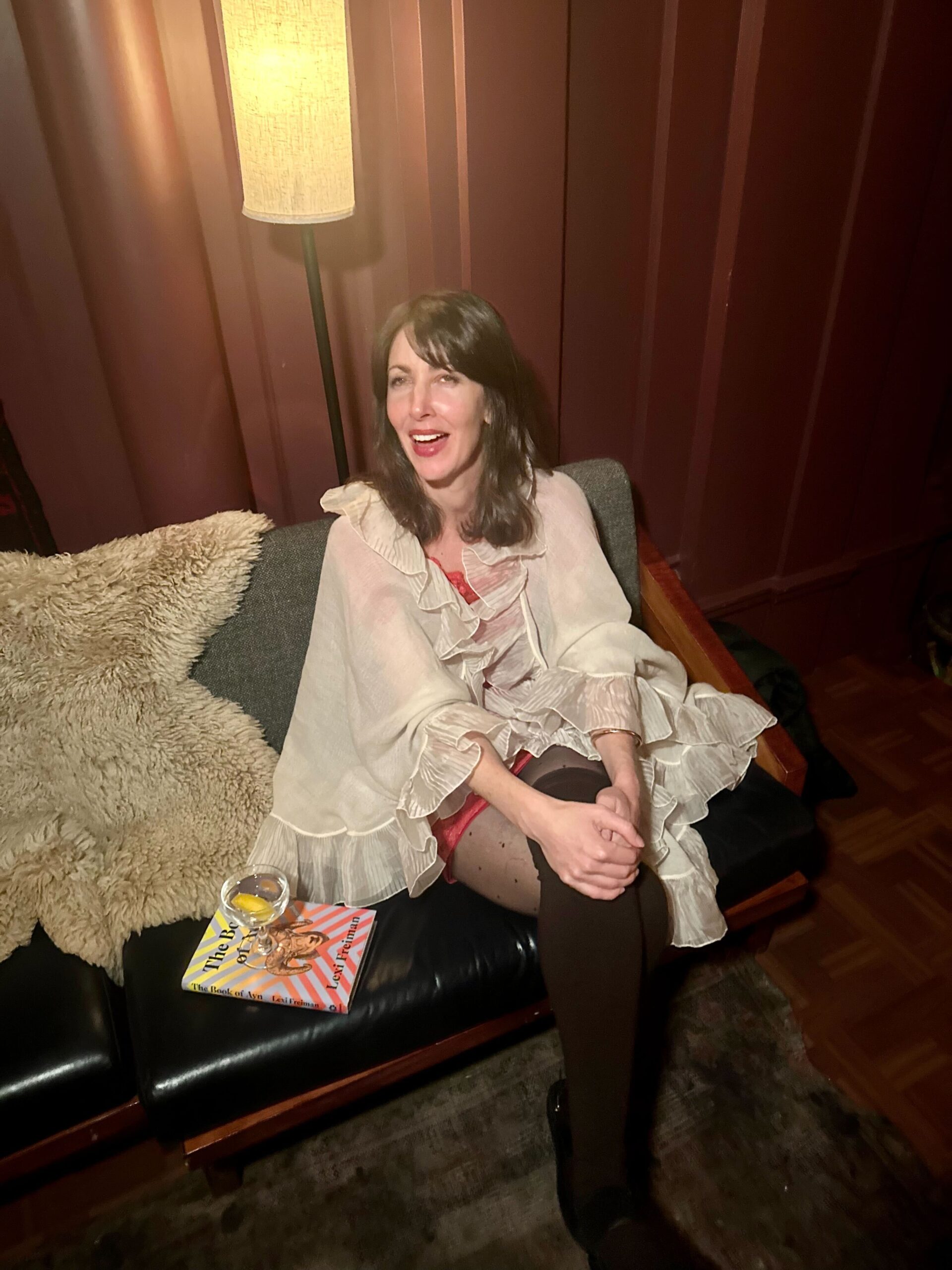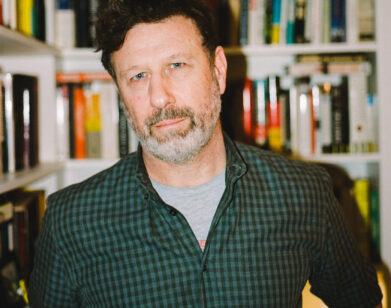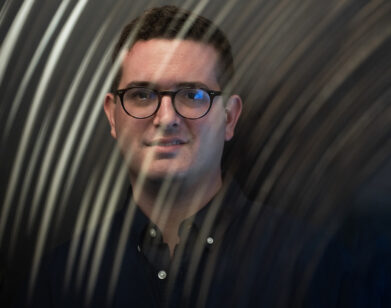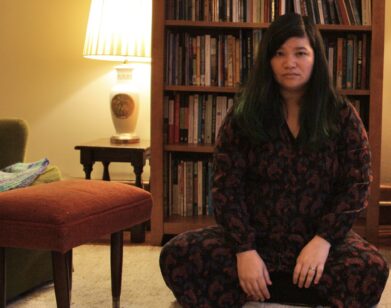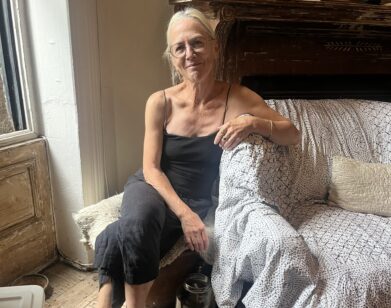LIT
Lexi Freiman Wrote the Year’s Funniest Novel. It’s About Ayn Rand.
I met the writer Lexi Freiman last summer when we both happened to be attending the same writer’s residency in the hills above Costa Brava in Spain. The first thing I learned about her was that she was wickedly funny. The second was that she had a novel out at the end of the year, about a woman who becomes obsessed with Ayn Rand, that 20th century heroine of me-first capitalism, which eventually leads her to a Greek island where she joins an ego-killing cult. That sounds crazy, I thought when she told me the plot—and may have even said it depending on how much wine I’d consumed at the afternoon snack gatherings.
Now, six months later, The Book of Ayn is out, and it’s not only the funniest novel I’ve read in years (no surprise from a woman with whom I shimmied under a docked boat on a Spanish beach to avoid the sun). It’s a comic work laced with extremely sharp insights and keen wisdom on our culture’s hyper-sensitive sore spots (cancellation, greed, the need to be seen as empathetic, etc.). It’s the best kind of writing: utterly fearless in the face of caution, a touch dangerous, and ferociously clever, with scenes so convincing that I occasionally had to shake off the thought of buying a one-way ticket to Lesbos to join this ego-free cult (Maybe the personality truly is nothing but “an elaborate shame deflection mechanism,” as Freiman writes). In its short life, the book has already become something of an instant classic, and that fact restores my faith in our nation’s readership. Freiman, a native of Australia, has been spending the past few weeks in New York City. Just after her novel hit bookshelves, we got on Zoom to discuss comedy, cute boys, and why a copy of Ayn Rand’s The Fountainhead is still a red flag.
———
CHRISTOPHER BOLLEN: Where are you?
LEXI FREIMAN: I’m at my friend’s place in Park Slope. She’s away having an affair with a man in Vermont and I get to languish here in the apartment.
BOLLEN: That’s the best kind of friend. I know from our time overlapping at a writing residency in Spain that you sleep in.
FREIMAN: It’s gotten even worse. I’ve started taking half a sleeping pill at 8:00 AM. I sort of wake up at maybe 6:00 o’clock and try to get back to sleep for an hour and then give up. And I get myself into such a state that I need medication to calm myself back into sleep. I just take a tiny bit—
BOLLEN: Just a nibble.
FREIMAN: It knocks me out for the next two-and-a-half, three hours. And then I’m up and feeling fantastic. I immediately pick up my phone and start scrolling and it brings me to life. So yeah, I feel like I’ve found the perfect toxic mix of meds and technology to start my day.
BOLLEN: Toxic is a good segue to Ayn Rand, which I realize I’ve been pronouncing wrong. Ean Rand. In your novel, you allude more than once to the fact that seeing an Ayn Rand book on someone’s bookshelf is tantamount to a cross upside down. It got me thinking about the aura of certain books, even just as physical objects. There was a time, fifteen years ago, if you saw someone reading Satanic Verses or American Psycho on the subway, it seemed transgressive. But that’s not really the case anymore. If an 80-year-old grandma is reading American Pyscho, I wouldn’t blink. Very few books can keep up that radioactivity. But Ayn Rand, The Fountainhead, it’s still so dangerous.
FREIMAN: It think it’s because her books are so irredeemably ideological. They are vehicles for her ideology, and they’re not well-written. So to me, when I see an Ayn Rand book on someone’s shelf, it’s not just an ideological thing, it’s an aesthetic thing. I think, “Oh, this person doesn’t know a good book.” It’s not like the Satanic Verses or American Psycho, which are good books. That’s good writing. Ayn’s writing is so belabored. It’s relentless and exhausting. It’s under-edited. It’s didactic. So you kind of have to be a bit into what she’s saying to plow through 1,000 pages. And also, no one has tried to redeem her, which is part of what interested me. There are edgy or provocative writers from the past, or those from another time that we might call misogynist or racist or antisemitic or homophobic, and people kind of try to resurrect those books and find other good stuff in them. Whereas with Ayn, I feel like nobody’s tried to do that because we’re still living in the nightmare of the capitalist world that she envisaged. Truthfully, I was less interested in the economics than her idea of selfishness versus altruism. There was something in that that I thought was worth exploring. Especially because we are all pretending not to be selfish, individualistic, slightly narcissistic people, and I don’t think that’s all bad.
BOLLEN: But your novel is hardly a take-down. There were moments when, as you say, her philosophy bore some truth to our times, whether we like to admit it or not.
FREIMAN: I didn’t want to just write a satire of Ayn Rand. That would be too easy and not very satisfying. The fun parts were identifying where there is a kernel of truth. Or where her ideas do present the better option in terms of the path a character might choose, as opposed to something more virtuous or altruistic. Or where there is a place for actually taking self-responsibility and agency and acting, rather than sitting back and waiting for life to present you with a good option. There’s some truth to that. And people like Jordan Peterson know that. I don’t think he’s ever identified himself as Randian. But a big reason why I think his philosophy or whatever you want to call it has taken off is because he’s kind of espousing some similar ideas in terms of self-responsibility, self-esteem, all that stuff. And it’s not bad.
BOLLEN: I know you have actually spent time on Lesbos with an ego-killing sect. Was that first trip purely for research or was it something you attended and decided to work into the plot?
FREIMAN: I didn’t go as research. I went in earnest to try to kill my ego, and I was already writing the book—or starting to write it. And so my experience there was colored by thinking about Ayn Rand because a lot of the philosophy at this particular place was Nietzschian in some ways. It was a weird mix of Nietzsche philosophy and then a lot of Buddhist and Hindu and Sufism, just this mashup of stuff where there were these funny crossovers. And there was a way of pushing Ayn Rand in there as well. And that’s what interested me. But it totally thwarted my attempt to get enlightened, which is what I had gone there for, because I spent so much time sitting in meditation thinking about fucking Ayn Rand. Well, not fucking her, thinking about her. I mean, you’re not supposed to think at all in meditation, but to be thinking about Ayn Rand is particularly sad.
BOLLEN: How long did you stay the first time?
FREIMAN: Two months.
BOLLEN: This is a comic novel, but it does paint a stark view of enlightenment or any stable belief system. Every attempt at fulfillment ends in a trap.
FREIMAN: Yeah. No further comments there.
BOLLEN: That isn’t a question. [Laughs]. But in the course of writing this quest, did you intentionally try to keep knocking Anna off any solid ground?
FREIMAN: There’s a natural instinct to create conflict—or when things seem to be going well, to provide obstacles. That also organically happens because as soon as anyone thinks they have the answer to anything, life presents the reality that, no, that’s part of the problem. We might think there are ideologies that will steer us perfectly through a chaotic world, and we may find them helpful if we navigate through it alone, but as soon as other people enter our sphere, then we’re going to have a problem.
BOLLEN: The book has three main locations—New York, Los Angeles, and Greece, and there is a hot young guy in each. All of them are first presented as simpletons, but in the end, each of them ends up embodying a kind of wisdom, or at least an understanding about the world that the clever narrator lacks.
FREIMAN: Yes, his character is very quick to criticize and categorize people and literally not call them by their names, but by some noun that describes their essence to her, which is usually a bit diminishing. And in the end, maybe they weren’t as simple or as delusional as she thinks. And so her notions get upended. And of course, there’s a little bit of semi-autobiographical truth to some of these characters and experiences, which you know.
BOLLEN: Certainly not the relationship on the island with the barely-legal guy!
FREIMAN: Certainly not! Actually, I had someone reach out to me on Instagram saying, “I just read the part where your protagonist dates handsome young boys. And I was just interested in whether that’s something that you do in real life?”
BOLLEN: Ask him to send his ID.
LEXI FREIMAN: Oh, let’s roll the dice. But all I was going to say about the semi-autobiographical model is that people surprise you.
BOLLEN: You tackle some prickly aspects of cancel culture. When you were writing, did you ever doubt yourself and wonder, “Am I going too far? Will I get canceled?” Or is your instinct just to touch the most dangerous subjects and not worry if they will explode?
FREIMAN: I think it depends on the draft. In a first draft, I was going to lots of places that have since been deleted. Part of the process of writing a book like this—and maybe any book—is going to the most risky, edgy, potentially dark place, and digging around in there and seeing if the thing you are saying is worth saying. And I think the more you edit, the better or clearer the idea becomes. And then, generally, any weirdness, any weird actual animosity or feeling of irritation that you might have with a thing that could tip your satire over the edge, gradually just gets blunted. Or you lose interest in it and you can see it objectively. And you also start to question those ideas. And so what might start as really spiky just becomes, “Well, that’s too much.” But there were times when I was like, “No, I think people can handle this.”
BOLLEN: Although I feel like living through the past six years we’ve seen how thin-skinned everyone has become.
FREIMAN: Some people can’t and won’t handle things, it’s true. And I think luckily some of that stuff has sort of calmed down in the last year-and-a-half or so. But yeah, publishing this book in 2020 would’ve probably been a total disaster. So I think I got a bit lucky with the timing. But you’re always going to offend somebody and you can’t let that get in the way of the larger project. And hopefully enough people feel that way. I mean, I do think we’ve been terrorized by lunatics on Twitter for long enough now.
BOLLEN: I also think books are a very different medium than the group pile-on of Twitter. It’s first an individual relationship between author and reader, and readers tend to be willing to go along with a writer, at least a talented one, with some benefit of the doubt. Even when it’s Ayn Rand. I will say, I was surprised to learn that she was dumped by her younger lover and it destroyed her life. Especially for someone espousing individuality and the power of the self.
FREIMAN: It’s so undignified in a way. She literally became one of those women… Like, if she were alive now, she would’ve started a blog. Like, “My ex is borderline.” And she would’ve written essays on his behavior and joined forums to talk about her narcissistic ex. She really had no tools in the end for how to actually live and let live, which was her whole philosophy. She couldn’t let it go. She had to destroy him reputationally. And I think it just ate away at her. She never really wrote anything significant again. I mean, she was older by then, but still.
BOLLEN: One thing you must learn when you’re dumped in a serious relationship is, “Never become the person who is still complaining about their evil ex five years later.” Don’t do it, even if you want to.
FREIMAN: You do have to make a decision in a sense. Especially as a writer, it can consume you in a way that it enters your work. Some people have made great careers on writing vindictive fiction about their exes, but I still think they probably become pretty boring. I had a friend once say to me, “You need to stop talking about that guy.” At the time, it seemed harsh, but he was right. He should have said that to me six months earlier.
BOLLEN: Who are the comic writers that inspire you?
FREIMEN: There are some really funny writers who are so good with language and with the absurd or the counterintuitive, like Sam Lipsyte. And I remember chuckling a lot at George Saunders stories back in grad school. But the person who makes me chuckle in a slightly demonic way that I most enjoy—that laughter of “Wow, I can’t believe they said this”—is Michel Houellebecq. He’s one to those books that you see on the train you mentioned. I find him really funny, and I think it’s really subtle, what he’s doing. He’s just going straight for the most uncomfortable truth, which my favorite standup comedians do as well.
BOLLEN: I recently discovered that you can listen to old standup comedy shows on iMusic. I remembered thinking George Carlin was hilarious as a child, so a month ago I listened to one of his routines while walking in New York and it was so not funny. And the jokes felt really dated. There was a bit about him complaining about security at the airport and how it made no sense, and of course this was before 9/11. So it didn’t really hold up as clever. But then if you listen to Joan Rivers, she’s timeless. The humor transcends. I wonder if, when writing comedy, you worry about the jokes holding up after the cultural moment.
FREIMAN: I hope they do. Like all comedy, some of it will feel like it’s of a particular time. But because it’s Ayn Rand and because she’s not of this time, or in a sense she’s now timeless because she’s been so influential, I think there is a little bit more longevity. Because her ideas, they’re still in the culture and in the makeup of American life. But yes, there is a little bit of that feeling of not wanting someone to need too much insider knowledge about a microculture or the moment. It’s hard because specificity is often what makes things funny. And so you have to be pretty specific, which then rules out the chances of your book being a classic for all time. But I do the same thing you do. I remember years ago, I used to walk around Manhattan listening to Eckhart Tolle. It’s a little cheesy, but it’s also great. And his voice on the audiobook just puts you in this very present state. But my favorite comedian at the moment is Tim Dillon. Have you ever listened to his podcast?
BOLLEN: No.
FREIMAN: I saw him live recently and that was fucking amazing. But I find myself walking around listening to Tim Dylan. And I find walking around laughing as a form of self-care, just listening to Tim Dillon’s horribly offensive jokes as I wander the streets of New York.

